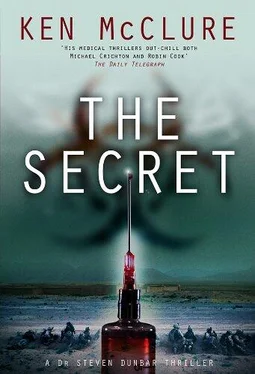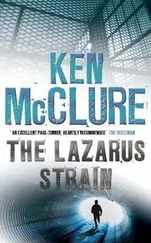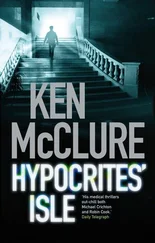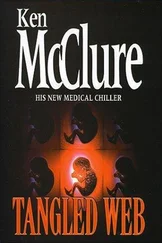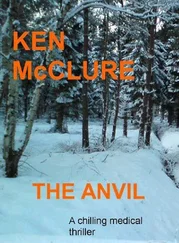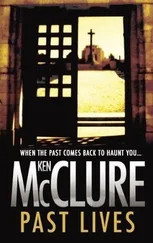‘Good of you to see me,’ said Steven.
‘A pity it’s under such tragic circumstances,’ said North with a sigh. ‘Did you know Simone well?’
‘We’d been friends for some years,’ Steven replied. ‘You?’
‘I met her a few years ago at a polio conference in Geneva. She seemed a very dedicated woman.’
Steven nodded. ‘She was. Did you attend the meeting in Prague?’
‘Yes. I was there with one of my group but she and I didn’t have much time to talk. I think it was for that reason that she asked if she could come and see me in London. Apparently she was coming here anyway to see a couple of pharmaceutical companies about upping their support for the vaccination effort in Afghanistan.’
Steven smiled. ‘Sounds like Simone. Can I be rude and ask what exactly she was coming to see you about?’
‘She didn’t actually say but I suppose she didn’t have to. She’s been working for some time on the eradication of polio programme supported by the World Health Organisation and we’re an international reference lab for polio and vaccine development. It’s quite normal for scientists and workers in the field to meet and exchange information. Sometimes things that work well in the lab don’t translate to the real world, so reports from the field are valuable.’
‘But you’re a British lab.’
‘And she was French,’ said North, seeing it coming. ‘Don’t read too much into that. The outfit Simone worked for, Médecins Sans Frontières , prides itself on being independent and international. Apart from that, labs working on polio are not too thick on the ground these days.’
‘And you are one of the best?’
‘We like to think so,’ North said with a modest smile.
‘Tell me, in the brief time you saw her in Prague, did Simone seem upset at all about anything?’
‘Upset?’ North thought for a moment. ‘More frustrated than upset, I think. She wanted to address the meeting but seemed to think the meeting organisers were avoiding her.’
‘Were they?’
‘I really couldn’t say,’ said North. ‘Meeting organisers are always under a lot of pressure from people wanting to speak, especially when things aren’t going too well and everyone has a theory. They have tough decisions to make.’
‘The Prague meeting was solely about eradicating polio?’
‘It was,’ agreed North. ‘Or more correctly why that hasn’t happened.’
Steven raised his eyebrows and North continued. ‘Ever since the WHO eradicated smallpox from the planet, it’s been the ambition of the organisation to do the same with polio. A multinational body with the grand title of the Global Polio Eradication Initiative was set up but achieving its goal has been proving more problematical than anyone imagined. The original target for eradication set in 1998 was the year 2000 but that wasn’t met. A new target was set for 2005 but that came and went too so they gave up on targets.’
‘So how are things going in 2011?’ asked Steven.
‘Not that well,’ admitted North with a grimace. ‘That’s really why the Prague meeting was called.’
‘So what d’you think the problem is?’
‘It’s not just the disease we’re fighting in the countries where polio is still hanging on. We have extreme geography and equally extreme politics to contend with as well. The situation in northern Nigeria where the predominantly Muslim population are very suspicious of vaccines from the west interferes with vaccination programmes, and the ever-changing situation in Pakistan is a factor too, not to mention the inaccessibility of the Afghan/Pakistan border regions with their mountain passes and remote villages. Apart from that — and this is a personal hobby horse — I think it actually might not be possible to completely wipe out polio simply because of the vaccine they’re using.’
‘The vaccine?’
‘They’re using a live virus vaccine. It’s polio virus that has been attenuated so it can’t cause polio any more but will elicit the same immune response and cause the body to produce antibodies which will be effective against the real thing. It has the added convenience that it can be given on a sugar lump.’
‘I think I had that,’ said Steven. ‘Are you suggesting it’s not effective?’
‘Oh, no, it’s very effective.’
‘Then...?’
‘I suppose it’s an academic point,’ North conceded, ‘but the fact remains that polio virus can’t be considered completely wiped out if it lives on inside you... even if in an altered form.’
‘I see,’ said Steven, silently thinking that it did seem to be an academic point but feeling obliged to ask, ‘I take it there’s no alternative?’
‘Yes there is. There is a vaccine containing a completely inactivated form of the virus — all the virus particles are dead — but it has to be given by injection.’
‘So why not use that?’
North smiled. ‘Money, doctor, money, the bottom line to so much these days. We’re talking about maybe wiping out the last one per cent of the disease on earth. Pharmaceutical companies are commercial concerns. They exist to make money. The inactivated vaccine is very expensive to make and is in short supply. Governments in places like Pakistan, Afghanistan, Nigeria and India don’t want to spend money they don’t have to and the pharmaceutical companies don’t really want to make it because none of them wants to set up a hugely expensive production line to manufacture a vaccine which will kill off demand for itself almost as soon as it’s put into use.’
Steven let out a long sigh as he saw the problem.
‘You can’t really blame these countries for continuing to use the cheap vaccine to rid themselves of the immediate problem of polio without thinking too much about the finer points of epidemiology,’ said North.
‘Are there any countries in the world where polio is a major problem?’ asked Steven.
‘No,’ North admitted. ‘Cases of paralytic polio are currently running at one per cent of the numbers we saw in 1998.’
‘So...’ began Steven, feeling slightly embarrassed and wondering if he’d missed something.
North smiled and said, ‘It’s all right, I’m used to scepticism. There are those who see the complete eradication initiative as an academic exercise, an ego trip to wipe out a disease which to all intents and purposes is extinct as it is. The sugar lump vaccine has I admit reduced the occurrence of polio to a mere trickle of cases a year.’
‘I suppose I can understand their point of view,’ Steven confessed, ‘I mean given the financial mess we’re all in.’
North nodded in resignation. ‘Indeed. It’s hard to argue the case for a complete wipe-out, but the fact remains that, with a reservoir of the disease still out there, it can always make a comeback. It may be confined to just a few countries at the moment but they are troubled countries and internal strife encourages population movement. When people start hitting the road it’s not only their belongings they carry with them.’
‘Immigrants and refugees...’ murmured Steven thinking about his earlier conversation with Tally about TB making a comeback. ‘Where did Simone Ricard fit into all this?’
‘She’d been working with the Med Sans vaccination team in the Pakistan/Afghanistan border region, one of the real remaining problem areas. It’s been a really tough nut to crack.’
‘Do you have any idea at all what she wanted so badly to talk about at the meeting?’
‘I’m afraid not. As I said, we didn’t really have a chance to speak and I didn’t even go on the trip to the Strahov monastery with the others where we might have had an opportunity to talk.’
Steven nodded, then changed the subject. ‘Your research group, doctor; do they all work on polio?’
Читать дальше
